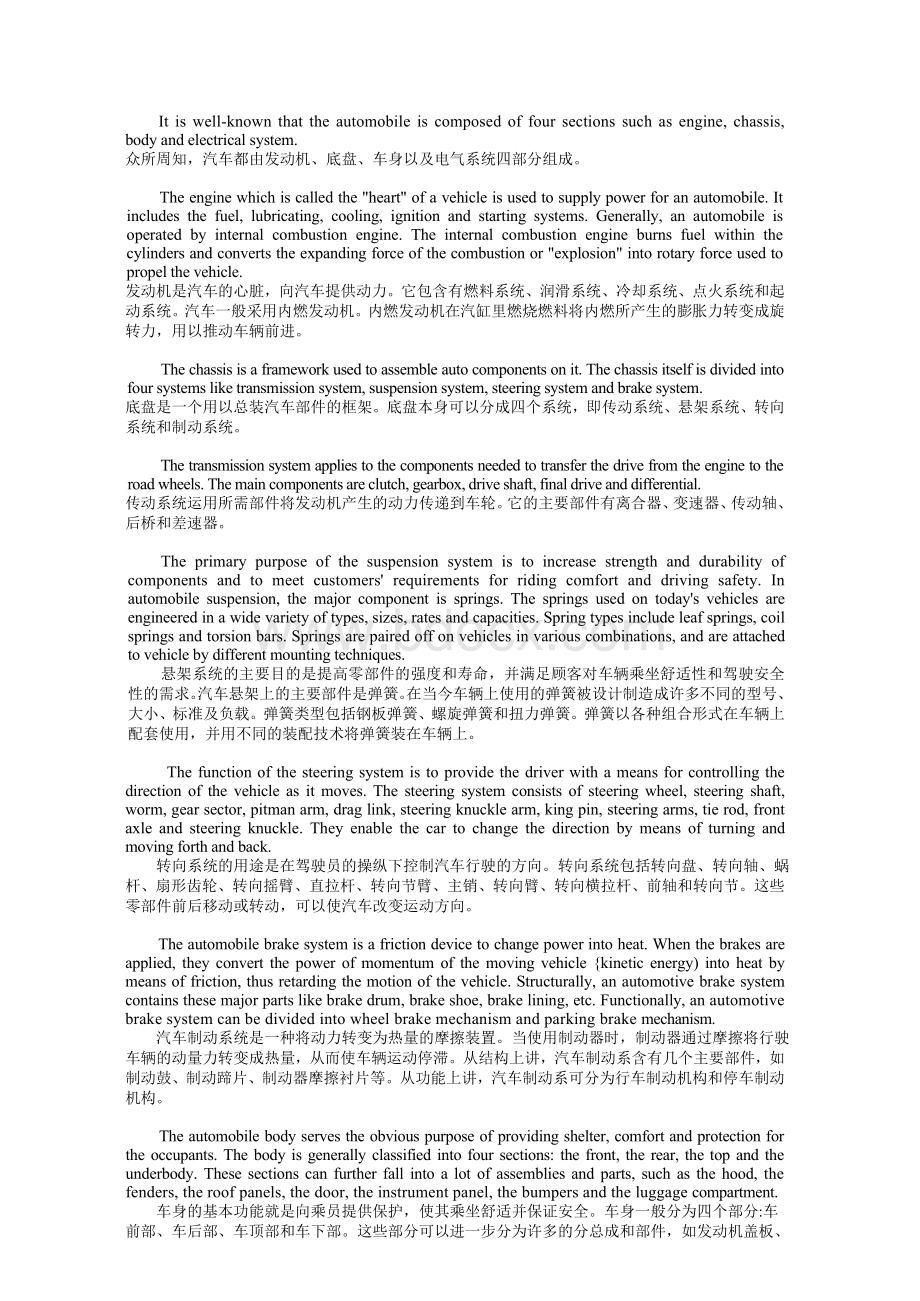汽车实用英语(已整理).doc
《汽车实用英语(已整理).doc》由会员分享,可在线阅读,更多相关《汽车实用英语(已整理).doc(34页珍藏版)》请在冰豆网上搜索。

Itiswell-knownthattheautomobileiscomposedoffoursectionssuchasengine,chassis,bodyandelectricalsystem.
众所周知,汽车都由发动机、底盘、车身以及电气系统四部分组成。
Theenginewhichiscalledthe"heart"ofavehicleisusedtosupplypowerforanautomobile.Itincludesthefuel,lubricating,cooling,ignitionandstartingsystems.Generally,anautomobileisoperatedbyinternalcombustionengine.Theinternalcombustionengineburnsfuelwithinthecylindersandconvertstheexpandingforceofthecombustionor"explosion"intorotaryforceusedtopropelthevehicle.
发动机是汽车的心脏,向汽车提供动力。
它包含有燃料系统、润滑系统、冷却系统、点火系统和起动系统。
汽车一般采用内燃发动机。
内燃发动机在汽缸里燃烧燃料将内燃所产生的膨胀力转变成旋转力,用以推动车辆前进。
Thechassisisaframeworkusedtoassembleautocomponentsonit.Thechassisitselfisdividedintofoursystemsliketransmissionsystem,suspensionsystem,steeringsystemandbrakesystem.
底盘是一个用以总装汽车部件的框架。
底盘本身可以分成四个系统,即传动系统、悬架系统、转向系统和制动系统。
Thetransmissionsystemappliestothecomponentsneededtotransferthedrivefromtheenginetotheroadwheels.Themaincomponentsareclutch,gearbox,driveshaft,finaldriveanddifferential.
传动系统运用所需部件将发动机产生的动力传递到车轮。
它的主要部件有离合器、变速器、传动轴、后桥和差速器。
Theprimarypurposeofthesuspensionsystemistoincreasestrengthanddurabilityofcomponentsandtomeetcustomers'requirementsforridingcomfortanddrivingsafety.Inautomobilesuspension,themajorcomponentissprings.Thespringsusedontoday'svehiclesareengineeredinawidevarietyoftypes,sizes,ratesandcapacities.Springtypesincludeleafsprings,coilspringsandtorsionbars.Springsarepairedoffonvehiclesinvariouscombinations,andareattachedtovehiclebydifferentmountingtechniques.
悬架系统的主要目的是提高零部件的强度和寿命,并满足顾客对车辆乘坐舒适性和驾驶安全性的需求。
汽车悬架上的主要部件是弹簧。
在当今车辆上使用的弹簧被设计制造成许多不同的型号、大小、标准及负载。
弹簧类型包括钢板弹簧、螺旋弹簧和扭力弹簧。
弹簧以各种组合形式在车辆上配套使用,并用不同的装配技术将弹簧装在车辆上。
Thefunctionofthesteeringsystemistoprovidethedriverwithameansforcontrollingthedirectionofthevehicleasitmoves.Thesteeringsystemconsistsofsteeringwheel,steeringshaft,worm,gearsector,pitmanarm,draglink,steeringknucklearm,kingpin,steeringarms,tierod,frontaxleandsteeringknuckle.Theyenablethecartochangethedirectionbymeansofturningandmovingforthandback.
转向系统的用途是在驾驶员的操纵下控制汽车行驶的方向。
转向系统包括转向盘、转向轴、蜗杆、扇形齿轮、转向摇臂、直拉杆、转向节臂、主销、转向臂、转向横拉杆、前轴和转向节。
这些零部件前后移动或转动,可以使汽车改变运动方向。
Theautomobilebrakesystemisafrictiondevicetochangepowerintoheat.Whenthebrakesareapplied,theyconvertthepowerofmomentumofthemovingvehicle{kineticenergy)intoheatbymeansoffriction,thusretardingthemotionofthevehicle.Structurally,anautomotivebrakesystemcontainsthesemajorpartslikebrakedrum,brakeshoe,brakelining,etc.Functionally,anautomotivebrakesystemcanbedividedintowheelbrakemechanismandparkingbrakemechanism.
汽车制动系统是一种将动力转变为热量的摩擦装置。
当使用制动器时,制动器通过摩擦将行驶车辆的动量力转变成热量,从而使车辆运动停滞。
从结构上讲,汽车制动系含有几个主要部件,如制动鼓、制动蹄片、制动器摩擦衬片等。
从功能上讲,汽车制动系可分为行车制动机构和停车制动机构。
Theautomobilebodyservestheobviouspurposeofprovidingshelter,comfortandprotectionfortheoccupants.Thebodyisgenerallyclassifiedintofoursections:
thefront,therear,thetopandtheunderbody.Thesesectionscanfurtherfallintoalotofassembliesandparts,suchasthehood,thefenders,theroofpanels,thedoor,theinstrumentpanel,thebumpersandtheluggagecompartment.
车身的基本功能就是向乘员提供保护,使其乘坐舒适并保证安全。
车身一般分为四个部分:
车前部、车后部、车顶部和车下部。
这些部分可以进一步分为许多的分总成和部件,如发动机盖板、挡泥板、车身顶板、车门、仪表板、汽车保险杠和行李箱。
Theelectricsystemsupplieslightinganddrivingpowerfortheautomobile.Itcranksmeengineforstarting.Itsuppliesthehigh-voltagesurgesthatignitethecompressedair-fuelmixtureinthecombustionchambers.Theelectricsystemincludesthebattery,generator,startingsystem,ignitionsystem,lightingsystem,hornsystem,radioandotherdevices.
电气系统向汽车提供照明与驱动电力。
它能起动发动机、提供高压电脉冲点燃燃烧室中空气和燃油的高压混合气等。
电气系统包括电池、发电机、起动系统、点火系统、照明系统、喇叭、收音机以及其他装置。
Theautodescriptionaboveseemstoconcludethatthoughautomobilesarequitedifferentindesign,theyarebasicallysimilarinstructure.
综上所述,尽管汽车的设计变化很大,然而汽车的构造基本上是一样的。
TextFour-stage-engineOperation
Therearevarioustypesofenginessuchaselectricmotors,steamenginesandinternalcombustionengines.But,theinternalcombustionengineseemstobetheonemostcommonlyusedintheautomotivefield.Accordingtothefuelenergyused,internalcombustionenginesarefurtherdividedintogasolineengines,keroseneengines,dieselengines,etc.
四行程发动机工作过程
发动机有各种各样的类型,如电动机、蒸汽机和内燃机。
但是,在汽车领域里内燃机似乎是用得最为普遍的发动机。
根据所用燃料,内燃机还可分为汽油机、煤油机、柴油机等。
Theinternalcombustionengine,asitsnameindicates,burnsfuelwithinthecylindersandconvertstheexpandingforceofthecombustionintorotaryforceusedtopropelthevehicle.Theactionstakingplaceintheenginecylindercanbeclassifiedintofourstages,orstrokes."Stroke"referstopistonmovement;astrokeoccurswhenthepistonmovesfromonelimitingpositiontotheother.TheupperlimitofpistonmovementiscalledTDC(topdeadcenter).ThelowerlimitofpistonmovementiscalledBDC(bottomdeadcenter).AstrokeispistonmovementfromTDCtoBDCorfromBDCtoTDC.Inotherwords,thepistoncompletesastrokeeachtimeitchangesitsdirectionofmotion.
顾名思义,内燃发动机是在汽缸里燃烧燃料,将内燃的膨胀力转变成推动汽车前进的旋转力。
发动机汽缸内的工作过程可以分为四个过程或行程。
(冲程)行程是指活塞的运动,即活塞从某一限定位置到另一限定位置的运动。
活塞运动的上限称为TDC(上止点),下限称为BDC(下止点)。
一个行程就是活塞从上止点到下止点,或从下止点到上止点的运动。
换句话说,活塞每完成一个行程,就改变一次其运动的方向。
Wheretheentirecycleofeventsinthecylinderrequiresfourstrokes(ortwocrankshaftrevolutions),theengineiscalledafour-stroke-cycleengine.Thefour-stroke-cycleengineisalsocalledtheOttocycleengine,inhonoroftheGermanengineer,Dr.NikolausOtto,whofirstappliedtheprinciplein1876.Thefourpistonstrokesareintake,compression,powerandexhaust.
Intakestroke.Ontheintakestroke,theintakevalvehasopened,thepistonismoving
downward,andamixtureofairandvaporizedgasolineisenteringthecylinderthroughthevalveport.Themixtureofairandvaporizedgasolineisdeliveredtothecylinderbythefuelsystemandcarburetor.
Compressionstroke.AfterthepistonreachesBDC,orthelowerlimitofitstravel,itbeginstomoveupward.Asthishappens,theintakevalvecloses.Theexhaustvalveisalsoclosed,sothatthecylinderissealed.Asthepistonmovesupward(pushednowbytherevolvingcrankshaftandconnectingrod),theair-fuelmixtureiscompressed.BythetimethepistonreachesTDC,themixturehasbeencompressedtoaslittleasone-tenthofitsoriginalvolume,orevenless.Whentheair-fuelmixtureiscompressed,notonlydoesthepressureinthecylindertoup,butthetemperatureofthemixturealsoincreases.
Powerstroke.AsthepistonreachesTDConthecompressionstroke,anelectricsparkisproducedatthesparkplug.Theignitionsystemdeliversahigh-voltagesurgeofelectricitytothesparkplugtoproducethespark.Thesparkignitestheair-fuelmixture.Itnowbeginstobumveryrapidly,andthecylinderpressureincreasestoasmuchas3~5MPaorevenmore.Thisterrificpushagainstthepistonforcesitdownward,andapowerimpulseistransmittedthroughtheconnectingrodtothecrankpinonthecrankshaft.Thecrankshaftisrotatedasthepistonispusheddownbythepressureaboveit.
Exhauststroke.AsthepistonreachesBDCagain,theexhaustvalveopens.Now,asthepistonmovesupontheexhauststroke,itforcestheburnedgasesoutofthecylinderthroughtheexhaust-valveport.Then,whenthepistonreachesTDC,theexhaustvalveclosesandtheintakevalveopens.Now,afreshchargeofair-fuelmixturewillbedrawnintothecylinderasthepistonmovesdownagaintowardBDC.
Thisfourstrokecycleofpistonwithinthecylinderisrepeatedtimeandagaintoputthevehicleforward.
发动机汽缸中的全部工作过程分为四个冲程的(即曲轴旋转两周的),叫做四冲程循环发动机,或四循环发动机。
为纪念德国工程师尼科拉斯、奥托搏士于1876年首次运用四行程循环原理,四行程循环发动机也叫奥托循环发动机。
发动机的四个活塞行程是进气、压缩、做功和排气。
进气冲程:
在进气行程中,进气门打开,活塞向下移动,可燃混合气通过进气门进入汽缸。
适当浓度的可燃混合气是由燃料系统和化油器提供的。
压缩冲程:
在活塞到达下止点时或者是活塞下限时,活塞开始向上运动。
同时,进气门关闭,排气门也关闭,所以这时的汽缸是封闭的。
当活塞向上运动时(这时是由转动的曲轴和连杆推动活塞),可燃混合气被压缩。
当活塞到达上止点时,可燃混合气被压缩到有原体积的十分之下甚至更少。
当油气混合燃料被压缩时,不仅汽缸里的压力上升,可燃混合气的温度也随之增加了。
做功冲程:
当活塞到达压缩行程的上止点时,火花塞产生电火花。
电火花是由点火系统向火花塞提供高压电脉冲而产生的。
电火花点燃可燃混合气。
可燃混合气开始发生剧烈燃烧,汽缸内压力达到3-5兆帕,甚至更高。
作用于活塞上强大的推动力推动活塞向下运动,并将这一推力通过连杆传到曲轴上的连杆轴颈上。
因此,当活塞受压向下运动时,推动曲轴转动。
排气冲程:
当活塞再一次到达下止点时,排气门打开。
同时,活塞向上移动,将废气经排气门排出汽缸。
随后,活塞达到上止点,排气门关闭,进气门打开。
当活塞又一次向下移动到达下止点时,新的可燃混合气被吸入汽缸。
汽缸活塞的四个冲程不断重复,推动着汽车前进。
ThePowerMechanismoftheEngine
Inareciprocatingengine,thepowermechanismiscalledthecrankshaftandconnectingrodassembly.Inthisassembly,allofthemajorunitssuchastheenginecrankcaseandcylinderblock,thepistonandconnectingrod(seeFigure3.1),thecrankshaftandflywheelworktogethertoconvertthermalenergyintomechanicalenergyusedtodrivethevehicle.
Theenginecrankcaseandblockareusuallycastintoonepieceandthereforecanbeseemedasthelargestandmostintricatepieceofmetalinautomobile.Theyareusuallymadeofhigh-gradecastalloyirontoimprovewearcharacteristicsofthecylinder.Thismajorunitmustbestrongandrigidenoughtowithstandanybendingordistortion.
Thepistonconvertsthepotentialenginesofthefuelintothekineticenergythatturnsthecrankshaft.Thepistonisacylindricalshapedhollowpartthatmovesupanddowninsidetheenginescylinder.Thepistoniscomposedofpistonhead,pistonrings,pistonlands,pistonskirtandpistonpinhole.Thepistonheador"crown"isthetopsurfaceagainstwhichtheexplosiveforceisexerted.Itmaybeflat,concave,andconvexoranyoneofagreatvarietyofshapestopromoteturbulenceorhelpcontrolcombustion.Insomeapplication,anarrowgrooveiscutintothepistonabovethetopringtoserve